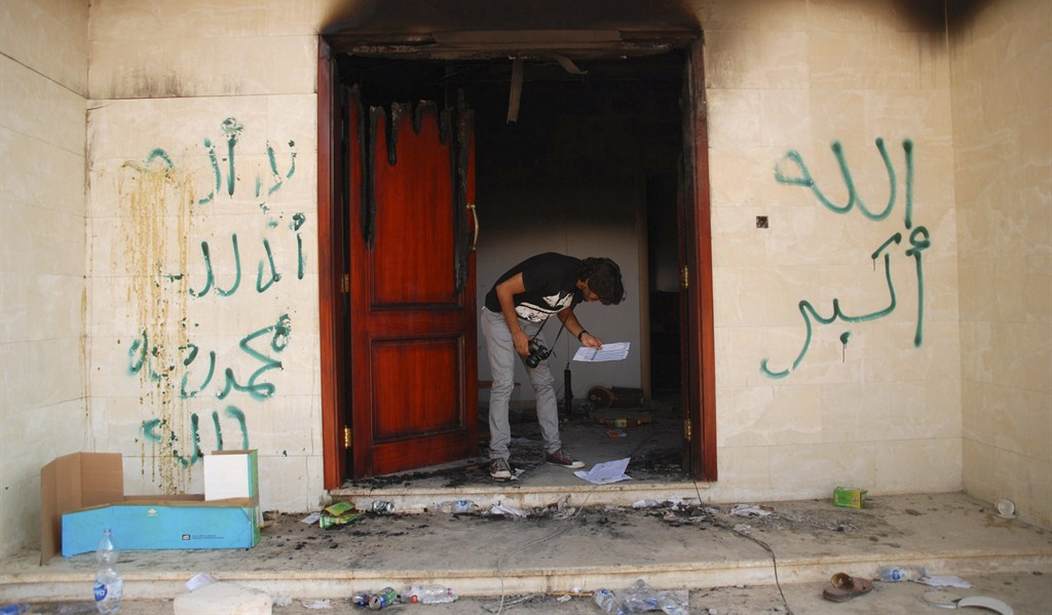"As Gene and Assistant Secretary Feltman and I were walking through here, they were talking about how the last time Jeff was here was when we were very worried that Gadhafi and [Libyan intelligence chief] Senussi were going to kill you," Clinton said in a speech to the staff at the U.S. Embassy.
"Yeah," said Cretz.
The State Department transcript notes there was "laughter" at this.
"I am very pleased to have this chance to thank each and every one of you, and to return as secretary of state to a free Libya," said Clinton. "And what an amazing experience."
Seven months before Clinton made this trip to Tripoli, President Obama announced in Brazil that he was ordering the U.S. military to intervene in Libya because "the writ of the international community must be enforced."
Within eight months of Clinton's trip, the Defense Department and CIA were producing repeated reports warning that Libya -- particularly eastern Libya -- was becoming a safe haven for terrorists, including al-Qaida-affiliated terrorists.
Thanks to a report released last week by the Senate Select Committee on Intelligence we now know some of the substance of these DOD and CIA warnings.
They demonstrate how Obama's intervention in Libya's civil war backfired and how the inexplicable negligence of Hillary Clinton's State Department put Americans unnecessarily at risk in Benghazi.
On June 12, 2012, according to the intelligence committee's report, the Defense Intelligence Agency authored a report entitled: "Libya: Terrorists Now Targeting U.S. and Western Interests."
Recommended
As characterized by the committee -- chaired by Democratic Sen. Dianne Feinstein of California -- this DIA report noted "growing ties between al-Qaida regional nodes and Libya-based terrorists."
The DIA said: "We expect more anti-U.S. terrorist attacks in eastern Libya [redacted], due to the terrorists greater presence there."
Six days later, according to the committee report, the Pentagon's Joint Staff daily intelligence report included a slide entitled: "Terrorism: Conditions Ripe for More Attacks, Terrorist Safe Haven in Libya."
It said: "[Redacted] support will increase Libyan terrorist capability in the permissive post-revolution security environment. Attacks will also increase in number and lethality as terrorists connect with AQ associates in Libya. Areas of eastern Libya will likely become a safe haven by the end of 2012."
A CIA report issued on July 6, 2012 -- "Libya: Al-Qaida Establishing Sanctuary" -- was more declarative.
"Al-Qaida-affiliated groups and associates are exploiting the permissive security environment in Libya to enhance their capabilities and expand their operational reach," said this CIA report.
"This year," said the CIA report, "Muhammad Jamal's Egypt-based network, al-Qaida in the Arabian Peninsula, and al-Qaida in the Lands of the Islamic Maghreb have conducted training, built communications networks, and facilitated extremist travel across North Africa from their safe haven in parts of eastern Libya."
Two months before the Sept. 11, 2012 terrorist attacks in Benghazi that killed four Americans, the CIA was already reporting that al-Qaida affiliated terrorists had made parts of eastern Libya "their safe haven."
Soon after that, a CIA officer told State Department officials that al-Qaida affiliated terrorists had training camps "within Benghazi."
On Aug. 15, 2012, according to the Senate committee report, the State Department's principal officer in Benghazi called together an "Emergency Action Committee" to discuss "the deteriorating security situation in Benghazi."
The next day, Ambassador Chris Stevens sent a cable to State Department headquarters in Washington, D.C., summarizing the points made at this meeting.
Stevens' cable said a CIA officer had "briefed the EAC on the location of approximately ten Islamist militias and AQ training camps within Benghazi."
When Gen. Carter Ham, then commander of AFRICOM, saw this assessment of the situation in Libya, said the Senate report, he offered to extend the deployment of DOD's Site Security Team -- a group "16 special operations personnel detailed to the Chief of Mission in Libya."
"After reading the August 16, 2012, EAC cable, General Ham called Ambassador Stevens and asked if the Embassy needed the SST from the U.S. military, but Stevens told Ham it did not," said the Senate report. "Shortly thereafter, Stevens traveled to Germany for a previously scheduled meeting with Ham at AFRICOM headquarters. Ham again offered to sustain the SST at the meeting, and Stevens again declined."
"State Department headquarters made the decision not to request an extension of the SST's mission in August 2012, approximately one month prior to the attacks, because State believed that many of the duties of the SST could be accomplished by local security forces, DS agents, or other State Department capabilities," said the report.
After the Sept. 11, 2001 terrorist attacks, Congress authorized the president to use military force to deny al-Qaida a sanctuary in Afghanistan. In March 2011, President Obama unilaterally ordered the U.S. military to intervene in Libya's civil war -- and helped turn that country into a sanctuary for al-Qaida-affiliated terrorists.

























Join the conversation as a VIP Member